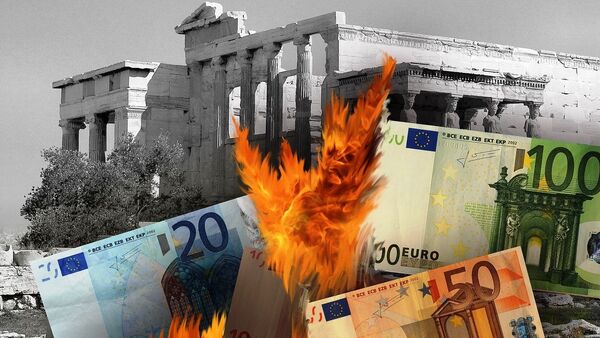Kristian Rouz - Greece and its international lenders have reached an agreement to continue bailout funding for the indebted nation in exchange for a set of fiscal reforms. The looming overhaul of Greece's budget is expected to boost Athens' long-term fiscal sustainability, promoting a further expansion of the tax base, as well as cuts to government spending.
According to a statement from the European Commission (EC), the deal was reached Saturday, and Athens will unveil the reforms at an upcoming Eurogroup summit on May 24. Eurogroup is composed of Eurozone finance ministers.
"The Greek authorities aim to implement these measures as swiftly as possible in advance" of the Eurogroup meeting, the European institutions said in a statement. "To this end, intensive exchanges between the institutions and the Greek authorities will continue in the coming weeks."
The reforms will be implemented in the upcoming weeks, and ahead of another summit slated for June 21, according to the EC statement. The Commission hasn't provided additional details.
READ MORE: European Bailout Fund: Greece 'Probably' Doesn't Need More Credit Lines
Experts point out Greece's bailout package - coordinated at the height of the nation's fiscal turmoil back in 2015 - has allowed Athens to remain afloat regarding its public finance. However, the effects of the bailout and the entailing reforms have been largely debatable, as analysts generally agree it would still take decades for Greece to emerge as a fiscally- self-sustainable nation.
"We all want debt conditionality to be embedded in the growth strategy for Greece," Eurogroup President Mario Centeno said. "Ownership is the single word that may and should define the process in the coming months."
Greece's public debt has stabilized at some 180 percent of its GDP in recent years. The nation's debt-to-GDP ratio lowered to 178.6 percent last year, after peaking at 180.8 percent in 2016. The ratio is still, however, far above the pre-crisis levels of 109.4 percent back in 2008, and 159.6 percent in 2012.
The stunning levels of indebtedness accumulated by Greece over just one decade is poised to complicate the financial situation in the country until the debt relief program is over - which is not expected until 2030-2040. Greece's total debt outstanding is $377 bln.
However, the Greek government has achieved some solid progress cooperating with the creditors, which include the International Monetary Fund (IMF) and European lenders.
READ MORE: Greece Wants Eurogroup's 'Honest Compromise' on 2nd Bailout Review - Minister
Athens reached a fiscal surplus of 4.2 percent of Greece's GDP last year, which is more than twice the target of 1.75 percent set by the nation's creditors. 2017 also marked a second consecutive year Greece has had a budget surplus.
This albeit the overall living standards in Greece have somewhat deteriorated, as substantial levels of fiscal accommodation - based off irresponsible government spending - have been largely rolled back.
"This good news is a welcome shot in the arm for Greece ahead of the crucial Eurogroup discussions that must prepare a positive conclusion to the program this summer," Pierre Moscovici, European commissioner for economic affairs said. "The tremendous efforts made by Greece in recent years to repair its public finances and reform its economy are now paying off."
READ MORE: 'Clean Exit' From Bailout Program Chance for Tsipras to Be the Man, Win Election
Since the first signs of a broader European debt crisis emerged back in 2010, Greece has received some 260 bln euros in international assistance, but this funding only enabled the 2015 Greek crisis, which had threatened a possible Grexit - a now-forgotten word that made huge headlines in 2015.
Despite the recent positive signs, suggesting Greece and its creditors could reach a deal without a major standoff, the economic prospects of the nation are still unclear - as spending cuts and business-friendly policies are deemed insufficient without major improvements in infrastructure and realignment in productive forces.
These latter two require substantial levels of government spending - which Greece can't afford after having invested gigantic funds in welfare state policies over the past ttwo decades



